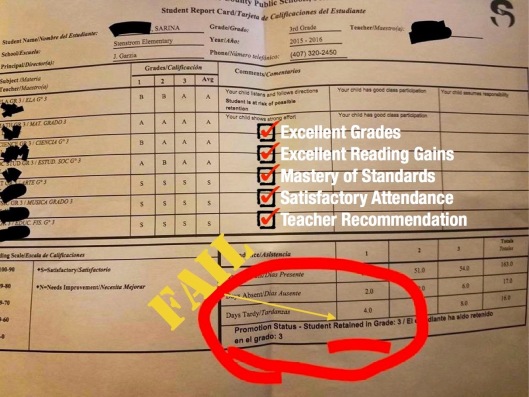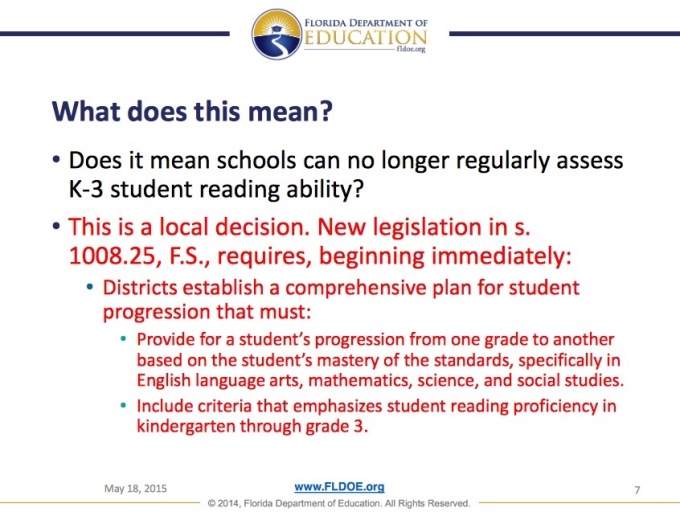by Sandy Stenoff
In light of the many third grade students, who have proven their mastery of third grade material, AND are also being retained as a result of having no FSA score, consider this:
Title XLVIII K-20 EDUCATION CODE Chapter 1008 ASSESSMENT AND ACCOUNTABILITY
11008.22 Student assessment program for public schools.— 2(1) PURPOSE.—The *primary purpose* of the student assessment program is to provide student academic achievement and learning gains data to students, parents, teachers, school administrators, and school district staff. This data is to be used by districts to *improve instruction*; by students, parents, and teachers to guide learning objectives; by education researchers to assess national and international education comparison data; and by the public to assess the cost benefit of the expenditure of taxpayer dollars.
Have the school districts retaining third graders forgotten the meaning of “improving instruction?”
Prior to NCLB, students were promoted based on a compilation of a student’s work for the whole year – it was called a portfolio. A report card is just a summary of a portfolio, a data report for 180 days of work in school.
This report card reflects a great year of achievement for 9-yr old Sarina in Seminole County. But wait…

According to Seminole County Public Schools, Sarina isn’t going to the fourth grade… at least not yet. Her mom might beg to differ.
The Statute spells out that students who face the threat of retention in the third grade may be promoted by Good Cause Exemptions, which include alternate assessments (one of which is an authentic portfolio). However, parents are refusing additional testing and making the case that, if their child is without a reading deficiency, they should not be facing the threat of retention in the first place. Therefore, they are insisting that districts promote their children based on 180 days of schoolwork – just like in every other grade.
To date, nine districts (and counting) have promoted third graders without a test score for the FSA or any of the alternative tests.
From yesterday’s Tampa Bay Times article, “Florida education rules permit portfolios for promotion to fourth grade” education reporter, Jeff Solochek writes:
“Parents argue the test score isn’t needed, suggesting that only students with demonstrated reading deficiencies should be subject to the requirements. District officials recite state law to counter the claim, saying the testing rules on social promotion apply equally to all students.
Regardless of that disagreement, nowhere in the state law does it say that a child with a poor score, or no score, must take an alternate test to the Florida Standard Assessment before seeking a portfolio option. In fact, the law offers a portfolio as an equal good cause exemption to an alternate assessment:“
The FLDOE provides official guidance for portfolios: 2013 Third-Grade Student Progression Technical Assistance Paper (TAP)
Apparently the DOE forgot about this option, because what they are peddling as a “portfolio” nowadays is a series of 42 mini-FSA tests. And parents are also refusing this series of tests, er… I mean “portfolio.” (There is nothing from the DOE stating that a REAL portfolio is not allowed in lieu of the portfolio tests.) Students ARE able to be promoted by a student portfolio… The DOE says so – and parents CAN request it.
Alternative assessments ARE a good cause exemption. If the situation warrants the use of an alternative test for promotion, a student portfolio IS an alternative assessment (just like the 2013 TAP states). ONLY ONE alternative assessment is required and a real portfolio IS one of those alternative assessments.
The TAP report states further at the top of page 6:
B-2. When should the teacher and students begin the third-grade student portfolio?
A parent of a student in grade 3 who is identified anytime during the school year as being at risk of retention may request that the school immediately begin collecting evidence for the portfolio.
From the Florida Department of Education’s own document “Read to Learn”
WHAT IS THE MEANING AND PURPOSE OF RETENTION?
Retention does not mean that the child has failed. It does not mean that teachers or parents are not working hard enough. It does mean that the child needs more instructional time and help to catch up and reach reading proficiency. The purpose of retention is to give *children who have substantial reading deficiencies* more time and the intensive instruction they need to catch up in reading.
So… if the DOE’s own statement about retention is that it exists to give a child WITH a SUBSTANTIAL reading deficiency more time, then what is the purpose of retaining a child without a reading deficiency, if not punishment or retaliation for denying them precious data? Remember that Commissioner Stewart has stated that the DOE does NOT use the FSA to punish students (video).
In April 2014, the Orlando Sentinel compared the numbers of students promoted by portfolios in Orange and Palm Beach Counties. Read: FCAT reading and third grade: Alert parents to portfolio option, lawmakers say
Districts have ample guidance and information to support their use of real portfolios to promote children from the Third Grade to the Fourth, and they have the authority to make these decisions, but some are CHOOSING not to do so.
From Slide 7 of FLDOE’s Information on House Bill 7069, as of May 18, 2015:

Districts are always telling parents that they do not teach to the test, and they teach the standards. Therefore, if teachers have been teaching the standards with fidelity, all independent class work and class tests should be a fair representation of a child’s work for the year – and documentation that the standards have indeed been taught satisfactorily.
As long as parents have the work, worksheets, tests, etc., or can get them from school, they should have everything needed to compile a real portfolio that should meet the state’s portfolio requirements. Schools should be more than willing to accept that this meets portfolio requirements.
By requiring students to complete the series of FORTY-TWO (yes, 42) multiple choice tests that they call a “portfolio assessment” over a real student portfolio, is your district saying that they are not confident that the education THEY are charged with providing to children meets their own requirements?
What is clear – is that the districts have only one of two choices. They can retain your child – ludicrous, which could force legal action. Or they can promote the children who have no reading deficiencies – within their power – and set a precedent they don’t want to set.
If the work our children do all year long is not to be valued or honored, why are we sending them to school at all? Exactly WHAT are we teaching them by allowing this to continue? Why not just send them to school in August to take the test and when they pass, they go straight to the next grade? If ALL that matters is a single test, why shouldn’t we just skip the whole year of school?
ACTIONS OF LAST RESORT
- If parents are confident that their child has mastered the Third Grade, it is ALWAYS their option to withdraw their child from school at any time and register him/her as a homeschool student (we recommend Florida Unschoolers). If parents choose to do this, they would withdraw the child, not as a homeschool student, but as a private school student.
- A portfolio can be compiles of all of the child’s work for the year (may need to get some classwork from the teacher) and have it reviewed by a certified teacher (we can help to locate one).
- Gather ALL of the child’s work, and organize it in a 3-ring binder, in date order, separated by subjects – ELA and Reading, Math, Science and Social Studies. THIS is the child’s portfolio, NOT the 42 separate mini-FSA-tests that the state calls a “portfolio”.
- If the portfolio is satisfactory, the teacher can certify that the child has met the requirements for the Third Grade. The child would then be promoted to the Fourth grade and can then be register in the Fourth Grade in their zoned public school.
Florida Unschoolers Website
Florida Unschoolers Facebook
CAUTION:
If your child attends a magnet or a charter school, withdrawing your child could relinquish your child’s space at that school and there is no guarantee that you could re-enroll there.
OF COURSE, IF YOUR DISTRICT BECOMES WILLING TO PROMOTE VIA PORTFOLIO, THERE WOULD BE NO NEED TO WITHDRAW YOUR CHILD FROM THEIR SCHOOL, WHICH WOULD BE THE PREFERRED METHOD OF SOLVING THIS PREDICAMENT.

Authentic Assessment Toolbox Jon Mueller. Professor of Psychology, North Central College, Naperville, IL.
What is a Portfolio? – Pinellas County Public Schools
Portfolio Assessment – North Carolina Public Schools – Assessment, Articulation and Accountability
Portfolio – Definition from The Glossary of Ed Reform. Seriously, take a look.


Does the homeschool option only work if you withdraw your child before school ends? Or can you do your “repeat” of the third grade (if the district does in fact retain them) over the summer?
LikeLike
jdscanlan – I’m not sure I understand your question clearly. You can choose to homeschool your child at any time you choose, during the school year or after the school year. You could repeat third grade as a homeschooler – if that is what you are asking – but if your child has already completed third grade, there would be no need to “repeat” it. Your child could simply continue from the point they left off in school and continue from there, wherever “there” is.
You can look at this post and see if there are options there for your child to move past retention to promotion.
Please also take a look at this: https://theoptoutfloridanetwork.wordpress.com/2015/08/15/parents-you-are-the-boss-and-you-can-say-no/
IMPORTANT – Please join the Opt Out Florida Third Grade group on Facebook:https://www.facebook.com/groups/optoutfloridathirdgrade/
for more help and support. We need everyone to help plan and organize for next year so that no more kids will have to go through what your child is facing now.
LikeLike
This is an excellent piece of well researched and carefully considered documentation of what is happening to third grade students in the state of Florida. As a retired teacher with over 35 years experience in three states and many levels, I strongly urge parents to continue to fight for the rights of all public school children. Perhaps we can finally make legislators understand that the test and punish attitude that prevails in some states must be completely stopped. Not only are students being deprived of the best education there appears to be an increased exodus of fine teachers from the profession because they refuse to teach under these conditions. Keep fighting the system and make your legislators be the ones who are accountable, and no longer punish innocent children and their teachers.
LikeLiked by 1 person
Thank you Trudy!
LikeLike
I feel that my daughter’s hard work was in vain. Thanks to Odyssey Preparatory Academy in Palm Bay, Fl, now my daughter feels dumb. She worked hard the whole year for what.????? I’m so upset and sad. I think this is the stupidest idea ever. I really don’t know what to do anymore since they keep telling us that theirs nothing that can be done.
LikeLike
Jacqueline,
Is your daughter being retained?
Please join the Opt Out Florida Third Grade group on Facebook for help and support. https://www.facebook.com/groups/optoutfloridathirdgrade/
IMPORTANT – Please read the pinned post when you join the group.
There is still much you can do to advocate for your child and to fight retention.
If you’re not on Facebook, please let me know and I will reach out to you privately.
Best,
Sandy
LikeLike
Hi. My daughter was retained in third grade just because she had a low score on this stupid test which I found out that wasn’t even made by teachers, but by regular people like us. I really don’t understand how this is even possible.!! I’m so disgusted with this idea and law. I’m also disgusted with a Odyssey Preparatory School in Palm Bay, Fl. They say that they are helping and that’s the least that they are doing. This is heartbreaking because now I have to see and deal with a little 8 year old girl that now thinks she’s dumb and stupid. Any suggestions.?? PLEASEEEE I’m desperate.!!!!
LikeLike
Sorry, but I don’t have Facebook
LikeLike
We recently moved to Florida from MD in late April. We had to move during that time due to my husband being active duty and deploying for a year to the Middle East.
I was not made aware of this third grade testing issue, until two days prior to the end of school year. I received a call from the Principal stating my son had to go to summer school and take the IOWA in order to advance to the fourth grade. Even though his prior teacher in MD gave the benchmarks that my son met for third grade there.
She explained if he did not pass the test, he would be retained. As they didn’t have enough time to make an evaluation about him. He ended up failing the test, and now has to repeat third grade. I am just wondering what options do I really have for him?
According to my old state, MD, he is supposed to be in fourth grade. But due to this test he failed, he has to go back to third. Any information would be greatly appreciated. I am really at a loss as to if there are any avenues we can take.
LikeLike
Brenda,
Please join the Opt Out Florida Third Grade group on Facebook for help and support. https://www.facebook.com/groups/optoutfloridathirdgrade/ IMPORTANT – Please read the pinned post when you join the group.
There is still much you can do to advocate for your child and to fight retention.
If you’re not on Facebook, please let me know and I will reach out to you privately.
Best,
Sandy
LikeLike